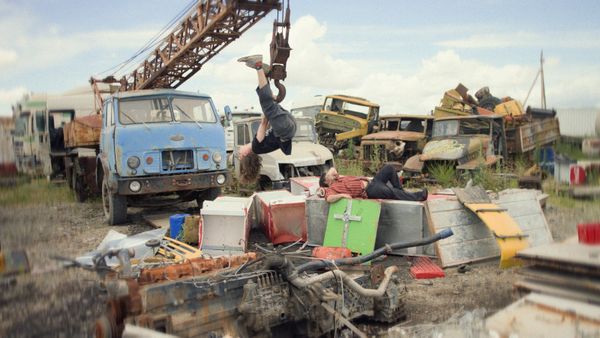Eye For Film >> Movies >> Holy Electricity (2024) Film Review
Holy Electricity
Reviewed by: Sergiu Inizian

As the camera gazes at a scrapyard, uncovering the charm of finding lost objects, it sets the scene for a feature debut that marches to the rhythm of spontaneity. Cinematographer-turned-director Tato Kotetishvili approaches scenes of hurt, song and joy similarly, giving the impression that he stumbles upon them within the bustling life of Tbilisi, Georgia. His static framing does not shy away from the recurrence of episodic characters and their eccentricities, inviting the viewer to look beyond the protagonists' story and grasp an environment that is key to fully understanding them. In this context, the bond between a nephew and an uncle is explored warmly but also with a degree of nonchalance that makes for a disparate plot. Despite its tendency to lose sight of a unifying thread, Holy Electricity picks up a musical cadence, guiding the viewer through a series of moments that shine with a disarming honesty.
Gonga (Nika Gongadze), a lanky, long-haired teenager, and his uncle Bart (Nikolo Ghviniashvili) spend their days searching the scrapyard for anything of value, relying on selling it to make a living. The boy's father just passed away and yet, beyond a sincere promise from Bart to support the teen, they stoically handle their everyday chores. We see them negotiating with street sellers and neighbourhood residents, in static shots that casually unfold before our eyes. After the two protagonists discover a case full of rusty crosses, they decide to revamp them as neon crucifixes. Confident in their promising merchandise, they try their hand at door-to-door selling. Encountering potential customers in a dingy block of flats, the duo find themselves in situations which are steeped in wry humour. Nodar Nozadze's editing is quick to shift the mood from frivolous neighbour bickering to toasts of friendship and the fuzzy feeling of an apartment filled with cats.

Kotetishvili's patchwork approach to storytelling feels ambitious but occasionally misses the mark, just as the glow of the crosses fails to impress some residents. The pair's interactions with an old drummer, a contortionist, and other quirky residents impart a vibrant image of Tbilisi, but their rhythm also seems to pave the way for a narrative that never fully materialises. The sudden rift between Gonga and Bart, after the uncle gambles their money away, is especially puzzling. Following the brief argument, the teenager meets a young Romani girl (Angela Delisenko), with whom he has long discussions about friendship and family. In parallel, Bart takes a shot at romance with a woman (Ineza Tsomaia) who makes miniature art and is very much attracted to the glow of the crosses. Both sequences act as a departure from a visual style focused on seeing beauty within mundanity, straining the narrative with sluggish dialogue and a fragmented structure.
Still, the first-time feature director has an earnest relationship with the story's loose form, employing a camera that seeks to find authenticity rather than stage it. This search leads him to explore a thread that quietly grabs the viewer’s attention as the plot gradually builds toward its conclusion. Seeing Gonga and Bart casually talking about gender, just before they joke about a pigeon crossing the street, we learn that the uncle is a transgender man. Kotetishvili allows this detail to linger over the entire runtime, even accepting that it might dissipate within the larger narrative. Positioning the camera so that the shot is side-by-side with his often marginalised characters, the Georgian filmmaker embraces their story unassumingly, which informs a cinematic style that feels generous and relatable.
The fragmented nature of Holy Electricity sometimes feels uneven, the debut leaning towards the shape of what seems to be a collection of shorts. And yet, there's vigour to this wandering form of filmmaking, especially as it seeks to genuinely portray the rhythm of everyday life - often represented as literal songs. Observing a woman in the rain, a man at a subway station, and even young Gonga singing on a pile of tires feels like embracing life's challenges head-on, in their unembellished form. This resounding back-and-forth between Kotetishvili's characters creates a lasting bittersweet charm and makes encountering them truly worthwhile.
Reviewed on: 11 Sep 2024















